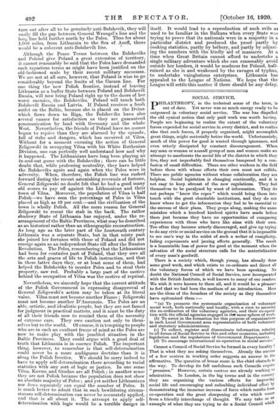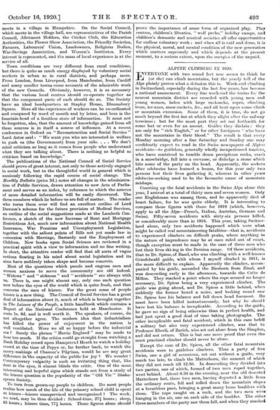SOCIAL SERVICE.
PHILANTHROPY, in the technical sense of the term, is out of date. Yet never was so much energy ready to be outpoured in voluntary social service. The war has dispelled the old cynical notion that only paid work was worth having.
People are beginning to realize the extent of the voluntary forces expended for social service in every district, and to realize also that such forces, if properly organized, might accomplish great things, might materially better the world. Unfortunately, much of this power for good is wasted through ignorance, and even utterly dissipated by constant discouragement. When any man or woman or a small group of men and women make an attempt to ameliorate the social life of the district in which they live, they not improbably find themselves hampered by a con- fusion of small difficulties. There are other workers in the field before them with whose efforts their own must not collide, There are public agencies without whose collaboration they are helpless. Social legislation is changing continually, and it is not easy to keep abreast of the new regulations. They feel themselves to be paralysed by want of information. They do not perhaps "know the ropes" which would bring them into touch with the great charitable institutions, and they do not know where to get the information they feel to be essential to the success of their plans. They grope along, making the same mistakes which a hundred kindred spirits have made before them just because they have no opportunities of comparing experiences with those who have like aims with their own. Too often they become utterly discouraged, and give up trying to do any civic or social service on the ground that it is impossible to see one's way in the midst of such a welter of complicity, failing experiments and jarring efforts generally. The result is a lamentable loss of power for good at the moment when the salvation of the social structure calls for the materialization of every man's goodwill.
There is a society which, though young, has already done some good work, and which exists to co-ordinate and direct all the voluntary forces of which we have been speaking. No doubt the National Council of Social Service, now incorporated with the British Institute, is well known to many of our readers. We wish it were known to them all, and it would be a pleasure to feel that we had been the medium of an introduction. Here are the ideas of the founders of the society as they themselves have epitomized them :—
"(is) To promote the systematic organization of voluntary social work, both nationally and locally, with a view to securing the co-ordination of the voluntary agencies, and their co.opern tion with the official agencies engaged in the same sphere of work. (b) To assist in the formation for this purpose of organizationr in each Local Government area representative of both voluntary and statutory administrations. (c) To collect, register and disseminate information relating to all forms of Social Service in this and other countries, including legislation and the regulations of Government Departments.
(d) To encourage international co-operation in social service.
Cannot a Council of Social Service be formed in every locality That is what they are asking themselves. Already the SUCCeS3 of a few centres in working order suggests an answer in tb° affirmative. The question of house room iii the chief obstacle in the way. To develop its full usefulness such Councils Winn.° "premises." However, certain central are already working ti admiration. In London, in the big towns and in the country they are organizing the various efforts for improving social life and encouraging and redoubling individual effort by demonstrating the immense increase of force which moults fora co-operation and the groat sharpening of wits which conies from a friendly interchange of thought. We may take as example of what they are trying to do a Social Council vili"
meets in a village in Hampshire. On the Social Council, which meets in the village hall, are representatives of the Parish Council, Allotment Holders, the Cricket Club, the Education Authorities, the Flower Show Association, the Friendly Societies, Farmers, Labourers' Union, Landowners, Religious Bodies, War-Savings Association, and Women's Institutes. Every interest is represented, and the mass of local experience is at the service of all.
Town conditions are very different from rural conditions, but there is quite as much energy displayed by voluntary social workers in urban as in rural districts, and perhaps more. From London, from Liverpool, from Manchester, from Cardiff and many smaller towns come accounts of the admirable work of the new Councils. Obviously, however, it is as necessary that the various local centres should co-operate together as that the component parts of each should do so. The Society have' an ideal headquarters at Stepley House, Bloomsbury Square. Here all the experience of workers can be co-ordinated and compared by word of mouth and by letter, and hero is the fountain-head of a limitless store of information. It must not be forgotten, also, that the amount of knowledge gained from all these sources is in itself a source of influence. At a recent conference in Oxford on "Reconstruction and Social Service" Lord Astor said : "We want you who are interested in welfare to push us (the Government) from your side. . . . We don't mind criticism so long as it comes from people who understand what they are talking about. There is nothing so helpful as criticism based on knowledge."
The publications of the National Council of Social Service should prove of great interest, not only to those actively engaged in social work, but to the thoughtful world in general which is anxiously following the rapid course of social change. The Monthly Bulletin (price 3d.) notes all changes in the administra- tion of Public Services, draws attention to new Acts of Parlia- ment and serves as an index, by reference to which the sources of more detailed information will be easily discovered. The three numbers which lie before us are full of matter. The reader who turns them over will find an excellent outline of Lord Dawson's scheme for the future provision of Medical Services, an outline of the social suggestions made at the Lambeth Con- ference, a sketch of the now Increase of Rent and Mortgage Restrictions Act, much new information about National Health Insurance, War Pensions and Unemployment Legislation, together with the salient points of Bills not yet made law in connodon with Marriage, Bastardy and the Employment of Children. New books upon Social Science are reviewed in a practical spirit with a view to information and no fine writing. In short, the attentive reader will find that all sorts of vague notions floating in his mind about social legislation and its aims have suddenly taken shape and become concrete.
Most of the questions which puzzle and engross men and women anxious to serve the community are old indeed. " Widows " and " sickness " and " accidents " are always with us. There is, one might almost say, only one such question now before the eyes of the world which is quite fresh, and that concerns the uses of leisure. For the great mass of people leisure is a new thing. The Council of Social Service has a great deal of information about it, much of which is brought together in The Leisure of the People, a little handbook which contains a Report of the National Conference hold at Manchester. It costs Is. 6d. and is well worth it. The speakers, of course, do not altogether agree. The modern idea that industrialism has killed the power of enjoyment in the nation is well ventilated. Were we all so happy before the industrial era ? Surely the phrase "Morrie England" may be made to hear too much_ If the critics could go straight from watching a Bank Holiday crowd upon Hampstead Heath to watch a holiday crowd at the time of Pepys or, far further back, to watch the merry-makings of Chaucer's Pilgrims, would he see any great difference in'the capacity of the public for joy ? We wonder ! Contemporary vulgarity is such an irritating thing that, like dust in the eyes, it almost blinds the critic. One of the most interesting and hopeful signs which stands out from a study of the leisure question is the popularity of the "Old Vie" Shake- speare Society.
To turn from grown-up people to Children. Do most people realize how much of the life of the primary school child is spent at leisure--leisure unsupervised and unorganized ? The week, we read, may be thus divided School-time, 27i hours ; sleep, 63 hours ; leisure time, 771 hours. Those figures alone should prove the importance of some form of organized play. Play centres, children's libraries, "wolf packs," holiday camps, and children's dramatic and musical societies all offer opportunities for endless voluntary work ; and when all is said and done, it ia the physical, moral, and mental condition of the new generation which matters supremely and which depends at the present moment, to a serious extent, upon the energies of the unpaid.







































 Previous page
Previous page